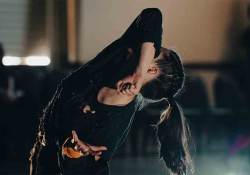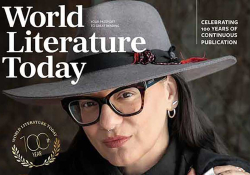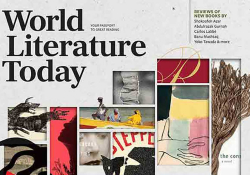Editor’s Note

That the ears might hear what the eyes can’t see.
– Monchoachi
From vinyl collections to mixtapes to digital playlists, music aficionados have always curated their favorites alongside bookshelves of beloved verse, fiction, and those little odds and ends that come into our possession over the years. (I’m not sure I can explain why a book with the world’s worst pun in the subtitle—You, on a Diet: The Owner’s Manual to Waist Management—is on my shelf at home.) No doubt there’s an Instagram hashtag for bookcases that proudly display music alongside books.
The Music & Lit cover feature in the current issue definitely has a mixtape feel to it, which is perhaps fitting given the prodigious diversity of world music. The lineup includes an excerpt from Kevin Simmonds’s forthcoming verse biography about legendary soprano Leontyne Price, jazz poetry from Ethiopia, Creole-language poetry from Martinique, an essay on Canadian singer-songwriter Amelia Curran, a “soca fugue” poem and other verse by American poet Samantha Thornhill, an interview with the bookish duo Lusterlit, a trio of piano-inspired stories and another trio of recommended rock operas, plus, last but not least, a city profile of Prince’s Minneapolis. Lusterlit counts Stravinsky, the Sex Pistols, Satie, and Coltrane (and cassette tapes) among its influences, which is perhaps why they’re such a perfect fit for the issue.
If the lineup here seems dominated by North American connections, what strikes me is how strongly Afro-Caribbean and African American it is. As Dolores Flores-Silva wrote in our recent special section devoted to literature from the Gulf of Mexico, “The Gulf’s loop currents of resistant countercultures—whether in jazz or blues, Mexican or Cuban son, counterclockwise ritual dances and flying bird-men, carnival parades or grassroots community activism—work from traditions of creolization and indigeneity that have shaped the world.” Of course, the Gulf Stream’s loop currents connect the Caribbean to the shores of Europe, West Africa, and beyond.
The Creole poem by Monchoachi seems especially noteworthy in this regard. The poem’s title, “Auscultate,” immediately brings to mind the image of a poet-doctor using a stethoscope to listen for heart rhythms and breathing patterns that lie beneath the surface of appearances. For Monchoachi (b. 1946)—a prolific poet and essayist in both French and Martinican Creole—as for many francophone writers over the past century, “language is a site of both play and resistance, a rhizomatic system of becomings, origins, and renewals,” writes translator Patricia Hartland. Fellow Martinican writer Patrick Chamoiseau contends, “Monchoachi has completely renewed . . . the Creole language—the way we read it, practice it, defend it. He has reshaped the relationship of this language to French, and has explored the blossoming of an unheard speech, its explosion into life.”
Hartland worked closely with the author to translate his collection Black and Blue Partition (Lémisté 2) and has come up with ingenious solutions to capture the rhythms, sonority, and onomatopoeia of the original. The lines “Sing w/voicez veiled rasping ’xhausted / ript shredded split // in tatters / to have opened them wide (them voices) swift winded” emblematize the verbal explosion Chamoiseau so admires. Listen to the author read the original, and your ear will revel in auscultation as tropical insects trill in the background. In a poetry universe where so much verse appeals merely to the eye or the intellect, it’s a salutary reminder of lyric’s origins in the voice of the griot, the bard, and the troubadour, all syncretized in today’s hip-hop and spoken-word poets.
So let the mixing begin. I hope readers will find something on our musical bookshelf to delight both the eyes and the ears.
Daniel Simon








